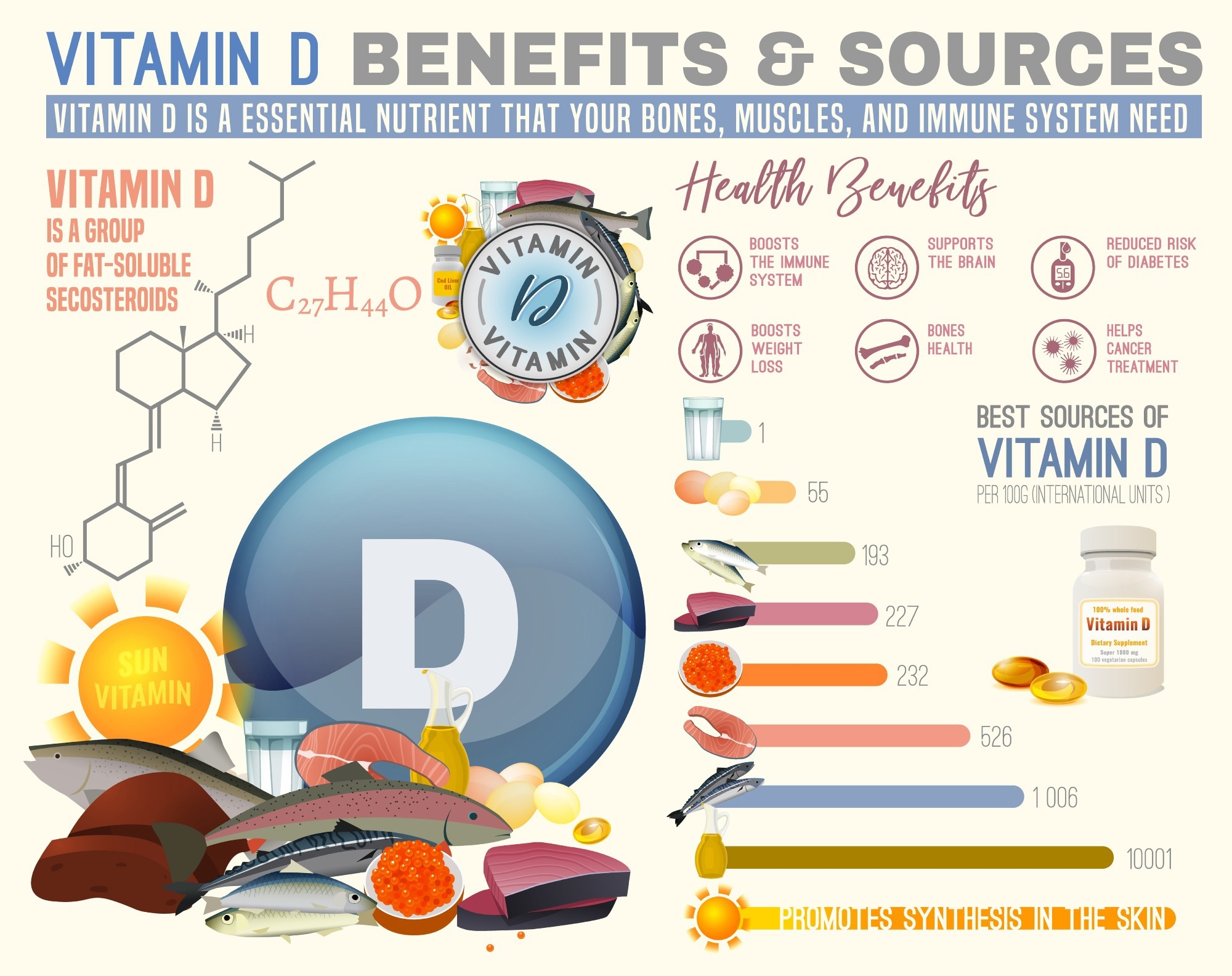Vitamin D: Essential functions in the body
The vitamin D connection: Exploring its impact on mood and mental wellbeing
Low vitamin D linked to depression & anxiety
Science says: Vitamin D & mental health link explained
Conclusion
References
Further reading
Vitamin D is crucial for maintaining various aspects of physical health. More recently, its role has also been implicated in mental health. However, research in this area is ongoing.

Image Credit: Photoroyalty/Shutterstock.com
Here, we look at the link between vitamin D and mental health; in particular, we explore possible links between vitamin D deficiency and depression, vitamin D and cognitive function, and also consider potential vitamin D benefits for mental health.
Vitamin D: Essential functions in the body
Vitamin D is important for numerous bodily functions such as calcium absorption and bone health, immune function, muscle function, regulation of cell growth, and glucose metabolism, and it also has anti-inflammatory properties.1
Some foods, such as fatty fish (e.g., tuna and mackerel), egg yolks, cheese, and mushrooms, provide a source of vitamin D. It is also produced in the skin as a result of exposure to sunlight.1
A deficiency in vitamin D can lead to several health issues, including rickets in children, osteomalacia in adults, and osteoporosis. Vitamin D deficiency is also linked with an increased risk of autoimmune diseases, cardiovascular diseases, and some cancers.1 Additionally, recent research has revealed a possible link between vitamin D and mental health disorders such as depression and anxiety.2,3

Image Credit: Double Brain/Shutterstock.com
The vitamin D connection: Exploring its impact on mood and mental wellbeing
In recent years, various studies have found evidence supporting the role of vitamin D in mental health. Specifically, it has been suggested that a deficiency in vitamin D may contribute to symptoms of depression and anxiety. However, not all studies that have looked into this relationship have found evidence to support this link.
Some studies have found that due to the antioxidant properties and influence on brain tissue (particularly in areas implicated in depression and anxiety), it is crucial for the prevention of mood disorders (e.g., depression and anxiety).2,3 Because of this, some researchers have suggested that vitamin D screening should be performed to prevent and/or treat these disorders.2
Low vitamin D linked to depression & anxiety
Research has linked vitamin D deficiency to various mental health issues. It is unsurprising, then, that there is much overlap between the symptoms of vitamin D deficiency and those of depression, anxiety, and cognitive decline. Symptoms of vitamin D deficiency include fatigue, mood changes, increased sensitivity to pain, muscle weakness, cognitive impairment (such as impaired episodic memory and executive dysfunction), feelings of overwhelming hopelessness or sadness, loss of interest in activities that were previously a source of enjoyment, weight loss or gain, loss of appetite, anxiety, and more.
Risk factors for vitamin D deficiency include being less exposed to sunlight, being elderly, having more melanin (having darker skin), obesity, and malabsorption syndromes. People with these risk factors are more prone to experiencing lower vitamin D levels. Lifestyle changes, such as getting more exposure to sunlight and introducing vitamin D-rich foods into the diet, can help to mitigate these risks. More research is needed, however, to fully understand the relationship between the risk of vitamin D deficiency and mental health.
Science says: Vitamin D & mental health link explained
A 2017 study that reviewed recently published papers investigating the link between vitamin D deficiency and depression concluded that there is adequate evidence to support an association between vitamin D deficiency and depression.4 Additionally, the study suggested that in individuals who have both depression and vitamin D deficiency, vitamin D supplementation may be an effective treatment.4
Another recent review study came to a similar conclusion that vitamin D levels inversely correlate with clinical depression.5 However, this study concluded that the evidence was not strong enough to support the use of vitamin D supplementation as a universal treatment for depression.5
A 2020 study reported that vitamin D supplementation could be useful in improving symptoms of anxiety.6
Further to this, numerous studies have reported diminished levels of vitamin D in people with Alzheimer’s disease as well as in healthy adults with cognitive impairment, suggesting a relationship between vitamin D and cognitive function.
Further studies are still needed in this area to understand the link between vitamin D and mental health fully and to establish how vitamin D supplementation may be used to treat and prevent mental health issues.
Conclusion
Overall, numerous studies have found evidence of an association between vitamin D deficiency and mental health issues. While more research is needed to understand the nature of this relationship fully, this evidence suggests that maintaining adequate vitamin D levels is not only beneficial to physical health but may also be beneficial to mental health.
Recent research has highlighted that public knowledge of vitamin D and its deficiency is poor. In a recent study, most (83%) were unaware that sunlight provided a source of vitamin D, and less than 1% were aware that certain foods provided a source of vitamin D.8 There is, therefore, a need for better public awareness of the role of vitamin D on overall health.
References
- Vitamin D Fact Sheet for Health Professionals [online]. National Institutes of Health. Available at: https://ods.od.nih.gov/factsheets/VitaminD-HealthProfessional/
- Akpınar, Ş. and Karadağ, M.G. (2022) ‘Is vitamin D important in anxiety or depression? what is the truth?’, Current Nutrition Reports, 11(4), pp. 675–681. doi:10.1007/s13668-022-00441-0.
- Anglin, R.E. et al. (2013) ‘Vitamin D deficiency and depression in adults: Systematic review and meta-analysis’, British Journal of Psychiatry, 202(2), pp. 100–107. doi:10.1192/bjp.bp.111.106666.
- Parker, G.B., Brotchie, H. and Graham, R.K. (2017) ‘Vitamin D and depression’, Journal of Affective Disorders, 208, pp. 56–61. doi:10.1016/j.jad.2016.08.082.
- Menon, V. et al. (2020) ‘Vitamin D and depression: A critical appraisal of the evidence and future directions’, Indian Journal of Psychological Medicine, 42(1), pp. 11–21. doi:10.4103/ijpsym.ijpsym_160_19.
- Zhu, C. et al. (2020) ‘Vitamin D supplementation improves anxiety but not depression symptoms in patients with vitamin D deficiency’, Brain and Behavior, 10(11). doi:10.1002/brb3.1760.
- Sultan, S. et al. (2020) ‘Low vitamin D and its association with cognitive impairment and dementia’, Journal of Aging Research, 2020, pp. 1–10. doi:10.1155/2020/6097820.
- Alkalash, S.H. et al. (2023) ‘Public knowledge, attitude, and practice toward vitamin D deficiency in al-Qunfudhah Governorate, Saudi Arabia’, Cureus [Preprint]. doi:10.7759/cureus.33756.
Further Reading
Last Updated: Jun 20, 2024